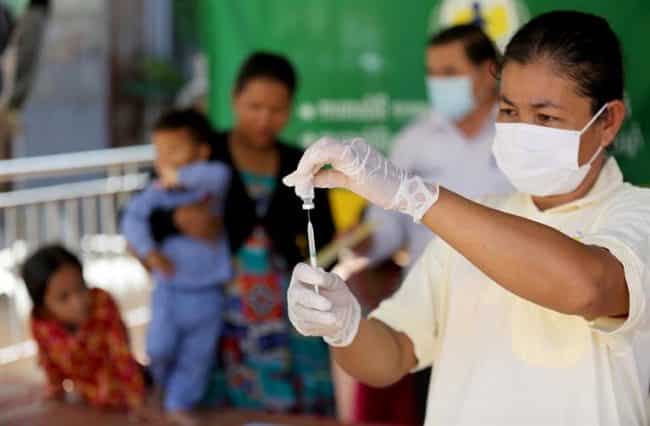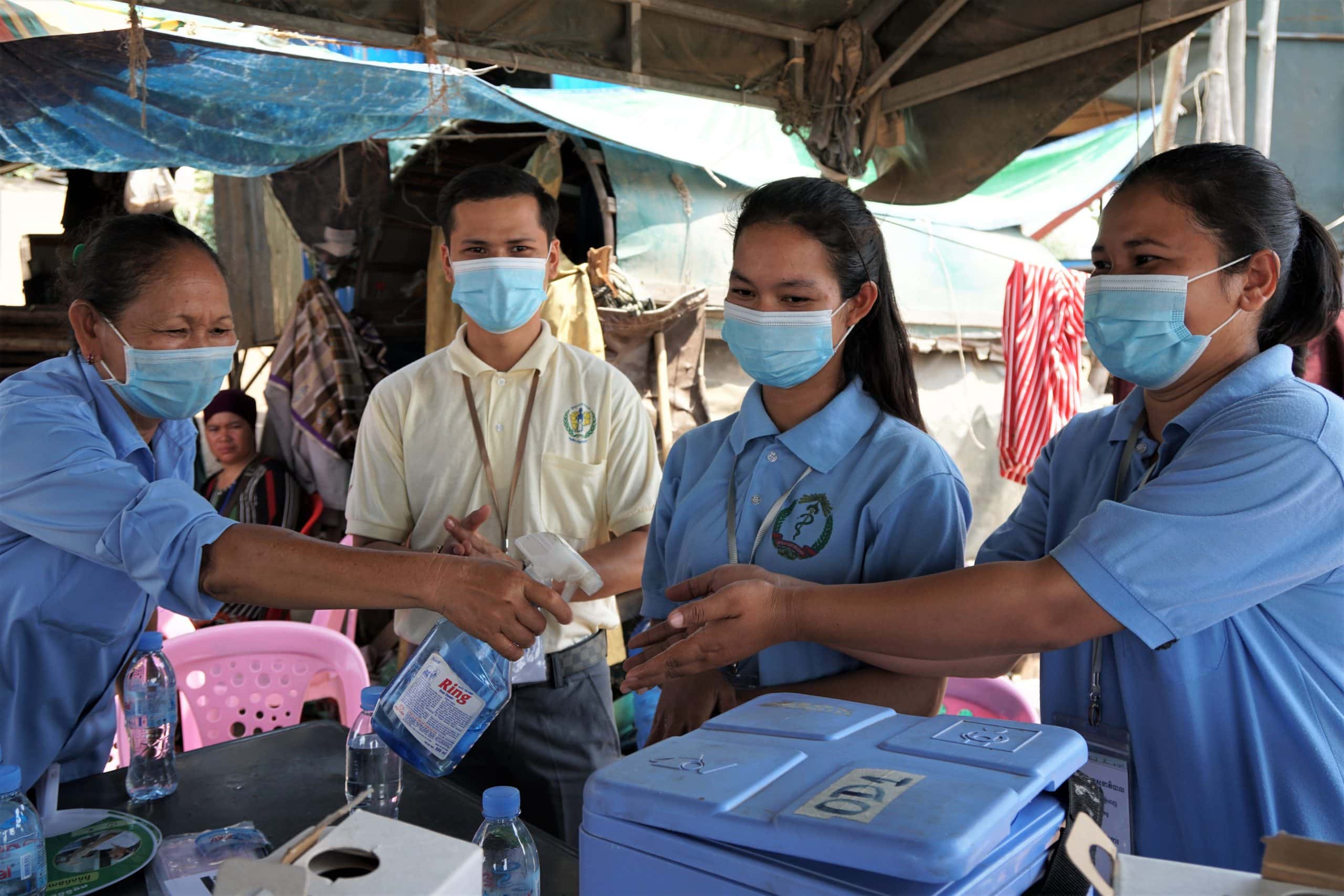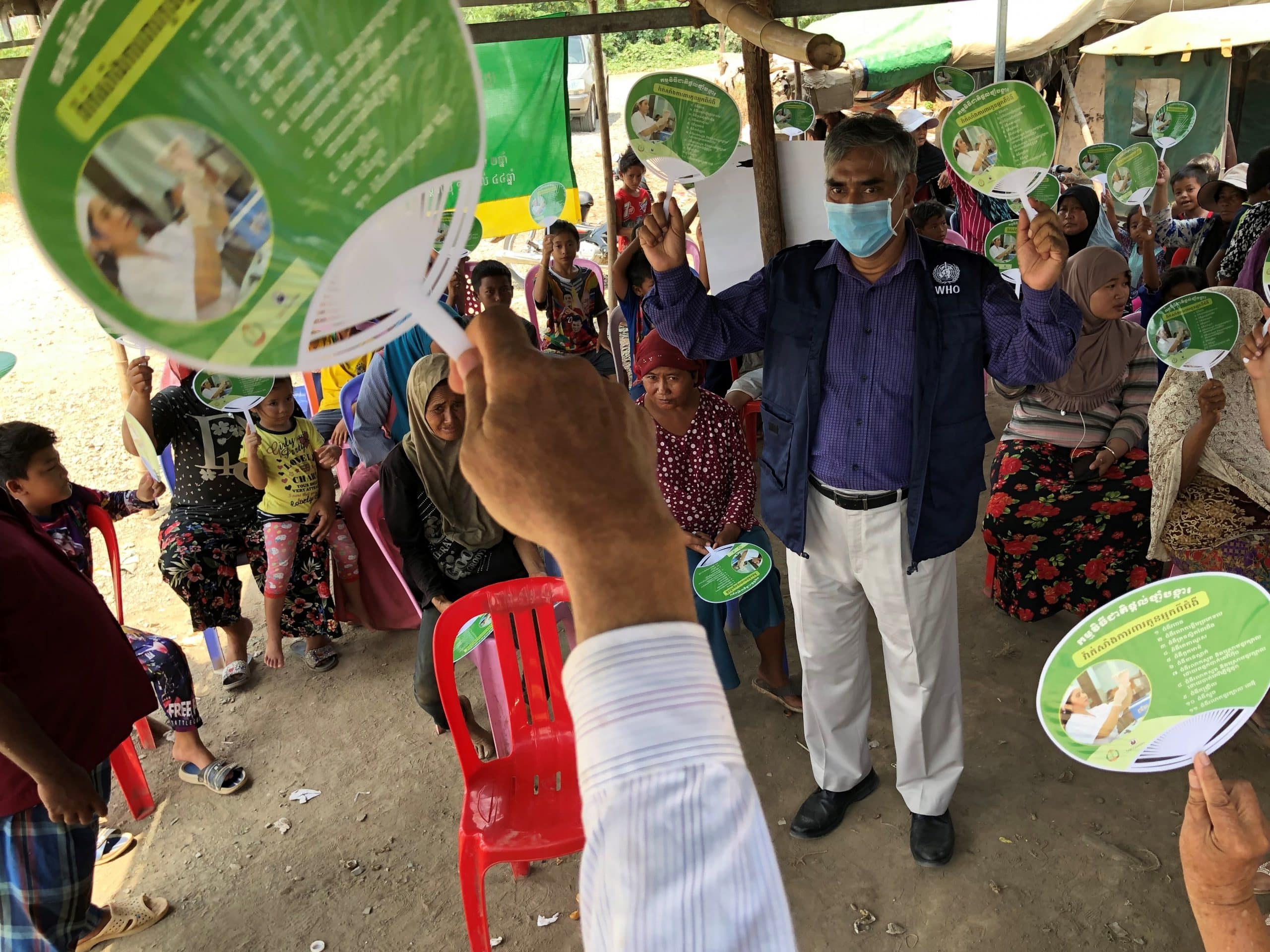Responding to a measles outbreak during the COVID-19 pandemic
Going village to village, “door to door” and “boat to boat” to maintain routine immunization services — and protect Cambodians from COVID-19

On a sunny day in May, Bun Sreng Sineth and other immunization staff set up an immunization site in a Muslim community in Phnom Penh’s Mekong Operational District. On the banks of the Mekong River, children and their caregivers gathered under a tent to be immunized and to learn how to prevent COVID-19.
Sineth and her colleagues were responding to two disease outbreaks: a measles outbreak, and the COVID-19 pandemic. In January 2020, as Cambodia confirmed its first COVID-19 case, it also confirmed 84 cases of measles.
“I’m really happy that the government continues these outreach vaccination services,” Sineth said after the final child had received his immunization. She felt confident in her ability to continue administering immunizations safely, largely because of information she had received from the Ministry of Health and the World Health Organization (WHO).
Measles is a highly contagious and serious disease that has surged in recent years. Globally, November 2019 saw the greatest numbers of measles cases recorded since 2006. And although Cambodia received its measles elimination status in 2015, following years of hard work by the government and health partners like WHO, it has not been immune to the global measles resurgence.
From 1 January to 4 May 2020, Cambodia recorded 341 measles cases, a significant increase from the 44 cases recorded during the same period in 2019. Of these 341 Cambodians, 65% had not been vaccinated.
“During the pandemic, it was more important than ever to maintain routine immunization services to protect children and the community,” said Dr Li Ailan, WHO Representative to Cambodia. “Otherwise, the risk of vaccine-preventable disease outbreaks would increase, and especially the risk of an uncontrollable measles outbreak.”
Along with measles, Cambodia was in the midst of rubella and pertussis outbreaks. It was critical that children receive immunizations to prevent them from contracting these diseases, and to prevent additional strain from being placed on the public health system during the COVID-19 pandemic.
n 2000, the Cambodia Ministry of Health established the National Immunization Program (NIP) to expand Cambodia’s immunization services. The programme promotes the well-being of all Cambodians by controlling, eliminating or eradicating targeted vaccine-preventable diseases. NIP, WHO, UNICEF and other partners work together closely to coordinate the programme’s immunization activities.
In March, as more cases of COVID-19 were reported in the country, WHO supported the development of interim guidance for NIP on how to safely continue its immunization activities and a risk management plan on how to respond to the measles outbreak during the COVID-19 pandemic. This guidance also outlined the role of NIP immunization staff in responding to COVID-19.
Because of this staunch commitment and careful planning on how to continue lifesaving immunizations, routine immunization was sustained throughout the pandemic.
Most Cambodians are immunized at health centres and hospitals, which conduct routine immunizations according to regular immunization schedules. Outreach teams also visit communities to conduct catch-up vaccinations and to reach children that are less likely to visit health centres and hospitals, such as in Cham Muslim and Vietnamese communities. Language, cultural and even geographic barriers can make it hard to immunize these minority groups. These communities are highly mobile, and many of them live on boats.
“In high-risk communities, our strategy is to go door-to-door or boat-to-boat,” said Mr Ork Vichit, NIP Manager.
Because outreach teams had been conducting catch-up outreach services in response to the measles outbreak, they had already established the relationships to enter villages and provide public education on COVID-19. They also put up posters encouraging safe and healthy behaviours to prevent COVID-19 in markets, pagodas and health facilities.
“Many communities don’t understand about COVID-19 very well,” said Sineth, who has performed vaccinations in dozens of communities in Phnom Penh. “They were feeling afraid — we have to help them understand how to prevent getting the virus.”
During the COVID-19 pandemic, Cambodians were encouraged to stay at home, and their movements were restricted during the Khmer New Year holiday in mid-April. Despite these challenges, immunization services and related activities continued in order to maintain and increase immunization coverage, and to respond to the measles outbreak.
In April and May, as Cambodia saw fewer cases of COVID-19, immunization staff like Sineth redoubled their efforts to ensure children received lifesaving vaccines, with an emphasis on reaching the unreached. They also corrected misinformation about COVID-19, educated on handwashing and hygiene practices, and adapted their immunization procedures to prevent the spread of COVID-19.
At health centres, staff took the temperatures of children and their caregivers before administering vaccines. At health centres and outreach sites, immunization staff ensured clients practiced physical distancing, keeping one metre apart, and vaccinated children one by one. These simple measures protected children, their caregivers and immunization staff.
Funding and support from partners including WHO supports NIP to promote the importance of vaccination, which helps immunization staff like Sineth reach more communities and provide better COVID-19 education, preventing further spread of measles and COVID-19.
In many communities, NIP was the first line of defence for both diseases. Their ability to maintain routine immunization services, respond to a measles outbreak, and educate communities about COVID-19, all at the same time, was no small achievement.
Fewer measles cases were reported in May, suggesting that the hard work of immunization staff like Sineth may have been successful in starting to contain the measles outbreak.
Strong relationships with the community, and between WHO, the Ministry of Health, and other partners make this all possible.
“We’ve always had great success when we work together,” said Mr. Ork.
Key contact:
Dr Md.Shafiqul Hossain
Technical Officer, EPI, WHO Country Office, Cambodia
hossains@who.int


















